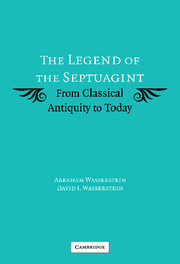Book contents
- Frontmatter
- Contents
- Preface and Acknowledgments
- Abbreviations
- Introduction
- 1 The Letter of Aristeas
- 2 The Hellenistic Jewish Tradition
- 3 The Rabbis and the Greek Bible
- 4 The Ptolemaic Changes
- 5 The Church Fathers and the Translation of the Septuagint
- 6 Among the Christians in the Orient
- 7 The Muslims and the Septuagint
- 8 Yosippon and the Story of the Seventy
- 9 Karaites, Samaritans and Rabbanite Jews in the Middle Ages
- 10 The Septuagint in the Renaissance and the Modern World
- Conclusion
- Appendix: In Partibus Infidelium: Zosimus of Panopolis
- Bibliography and Sources
- Index
4 - The Ptolemaic Changes
Published online by Cambridge University Press: 17 July 2009
- Frontmatter
- Contents
- Preface and Acknowledgments
- Abbreviations
- Introduction
- 1 The Letter of Aristeas
- 2 The Hellenistic Jewish Tradition
- 3 The Rabbis and the Greek Bible
- 4 The Ptolemaic Changes
- 5 The Church Fathers and the Translation of the Septuagint
- 6 Among the Christians in the Orient
- 7 The Muslims and the Septuagint
- 8 Yosippon and the Story of the Seventy
- 9 Karaites, Samaritans and Rabbanite Jews in the Middle Ages
- 10 The Septuagint in the Renaissance and the Modern World
- Conclusion
- Appendix: In Partibus Infidelium: Zosimus of Panopolis
- Bibliography and Sources
- Index
Summary
The list of so-called Ptolemaic changes that we find in our sources, in all its variety, is not imaginary or arbitrary. Although not all the instances of alleged changes made by the translators are found in our texts of the Septuagint, the apparatus criticus of the LXX shows that at least some of the passages cited by the Rabbis do indeed contain the readings mentioned or alluded to by them. Because we do not have all the Greek versions circulating in antiquity, we cannot be sure that more of these readings were not in fact part of some such version. But we have enough to show us that we are reading reports that contain information about texts actually current in antiquity. That the Rabbis selected from what was at their disposal some readings for mention in a list designed to register variants which are clearly approved of for some purposes (even if not accepted into the text) need not surprise us, nor should we suppose that there were not also readings of which the Rabbis might not have approved. But it is clear that what those who told the story and who listed the Ptolemaic changes had in front of them was a body of text(s) or readings that were not tendentious but exegetical and homiletic and, more importantly, approved for certain purposes.
- Type
- Chapter
- Information
- The Legend of the SeptuagintFrom Classical Antiquity to Today, pp. 84 - 94Publisher: Cambridge University PressPrint publication year: 2006
- 1
- Cited by

